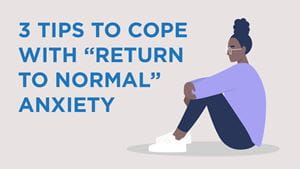
More than a year after the first cases of COVID-19 were found in New York State, many have become used to the “new normal” of staying home, limiting social circles and events and working remotely.
As the number of vaccinated individuals in our communities increases and restrictions for gatherings are reduced, an uneasiness to adjusting back to pre-pandemic life has started to emerge. According to a recent study from the American Psychological Association, more than 50% of Americans feel concerned about in-person interaction once the pandemic ends.
We asked Dr. Garry Spink, a psychologist at Rochester Regional Health for tips on how to help cope with re-entry fear.
According to Dr. Spink, there are several types of anxiety that people may be feeling as they think about navigating a return to normal. These can include:
“It’s helpful to consider what exactly is driving your anxiety,” explained Dr. Spink. “If you’re worried about your health, you might want to call your provider to talk about your personal health risks. If you’re worried about a return to work, talk with your supervisor or a trusted coworker. If you’re worried about a return to social activities and a rustiness with engaging with people in person, consider being open about that with family and friends.”
We’re reaching towards an uncertain end of an uncertain time. With guidelines continuing to adjust to the latest research and restrictions that have been in place for months being lifted, it’s important not only to acknowledge your anxiety and talk with your networks but also to examine your comfort level.
“Evaluate if the activity is something you need to engage in – listen to your gut and weigh your pros/cons,” said Dr. Spink. “Balance that with the people in your network’s comfort levels and build connections within those parameters.”
That could mean looking for ways to continue to connect with loved ones virtually. Or, if you’ve received the COVID-19 vaccine, following the CDC guidelines for getting together with other vaccinated households.
Relaxation, mindfulness, meditation, visualization and belly breathing exercises are great ways to help decrease stress and anxiety.
“These exercises can help you replace your body’s stress response with something that helps you feel more relaxed,” said Dr. Spink. “I find that mindfulness, the practice of being present without judgment, can especially help some people to remain calm when they feel their thoughts racing.”